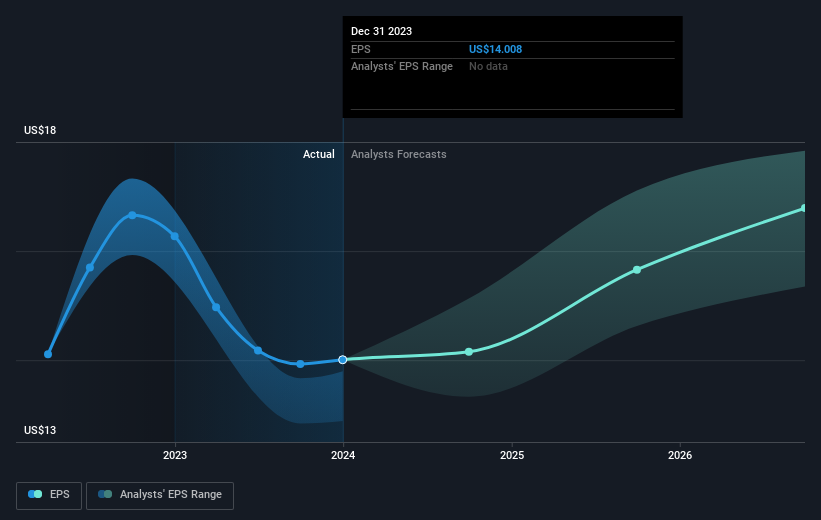- United States
- /
- Consumer Durables
- /
- NYSE:DHI
D.R. Horton's (NYSE:DHI) 31% CAGR outpaced the company's earnings growth over the same five-year period

When you buy shares in a company, it's worth keeping in mind the possibility that it could fail, and you could lose your money. But on the bright side, you can make far more than 100% on a really good stock. For example, the D.R. Horton, Inc. (NYSE:DHI) share price has soared 265% in the last half decade. Most would be very happy with that. On top of that, the share price is up 16% in about a quarter. But this move may well have been assisted by the reasonably buoyant market (up 12% in 90 days).
The past week has proven to be lucrative for D.R. Horton investors, so let's see if fundamentals drove the company's five-year performance.
View our latest analysis for D.R. Horton
There is no denying that markets are sometimes efficient, but prices do not always reflect underlying business performance. One imperfect but simple way to consider how the market perception of a company has shifted is to compare the change in the earnings per share (EPS) with the share price movement.
Over half a decade, D.R. Horton managed to grow its earnings per share at 28% a year. So the EPS growth rate is rather close to the annualized share price gain of 30% per year. This indicates that investor sentiment towards the company has not changed a great deal. Rather, the share price has approximately tracked EPS growth.
You can see how EPS has changed over time in the image below (click on the chart to see the exact values).

This free interactive report on D.R. Horton's earnings, revenue and cash flow is a great place to start, if you want to investigate the stock further.
What About Dividends?
As well as measuring the share price return, investors should also consider the total shareholder return (TSR). The TSR incorporates the value of any spin-offs or discounted capital raisings, along with any dividends, based on the assumption that the dividends are reinvested. So for companies that pay a generous dividend, the TSR is often a lot higher than the share price return. As it happens, D.R. Horton's TSR for the last 5 years was 285%, which exceeds the share price return mentioned earlier. This is largely a result of its dividend payments!
A Different Perspective
It's nice to see that D.R. Horton shareholders have received a total shareholder return of 61% over the last year. That's including the dividend. Since the one-year TSR is better than the five-year TSR (the latter coming in at 31% per year), it would seem that the stock's performance has improved in recent times. Someone with an optimistic perspective could view the recent improvement in TSR as indicating that the business itself is getting better with time. It's always interesting to track share price performance over the longer term. But to understand D.R. Horton better, we need to consider many other factors. Consider risks, for instance. Every company has them, and we've spotted 1 warning sign for D.R. Horton you should know about.
Of course D.R. Horton may not be the best stock to buy. So you may wish to see this free collection of growth stocks.
Please note, the market returns quoted in this article reflect the market weighted average returns of stocks that currently trade on American exchanges.
New: Manage All Your Stock Portfolios in One Place
We've created the ultimate portfolio companion for stock investors, and it's free.
• Connect an unlimited number of Portfolios and see your total in one currency
• Be alerted to new Warning Signs or Risks via email or mobile
• Track the Fair Value of your stocks
Have feedback on this article? Concerned about the content? Get in touch with us directly. Alternatively, email editorial-team (at) simplywallst.com.
This article by Simply Wall St is general in nature. We provide commentary based on historical data and analyst forecasts only using an unbiased methodology and our articles are not intended to be financial advice. It does not constitute a recommendation to buy or sell any stock, and does not take account of your objectives, or your financial situation. We aim to bring you long-term focused analysis driven by fundamental data. Note that our analysis may not factor in the latest price-sensitive company announcements or qualitative material. Simply Wall St has no position in any stocks mentioned.
About NYSE:DHI
D.R. Horton
Operates as a homebuilding company in East, North, Southeast, South Central, Southwest, and Northwest regions in the United States.
Excellent balance sheet, good value and pays a dividend.
Similar Companies
Market Insights
Community Narratives




